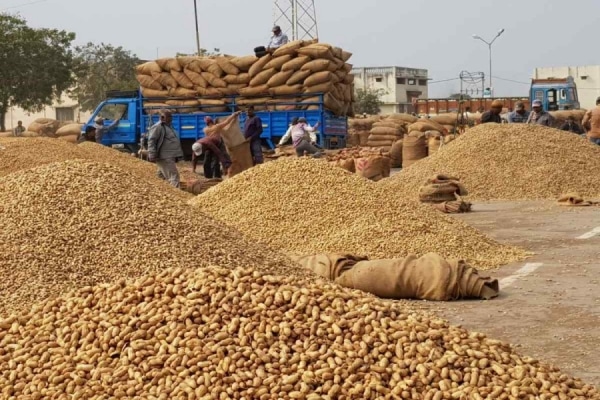Eduard Dreyer, a third-generation farmer near Bothaville in South Africa’s Free State, has built a resilient and diversified farming business with a surprising hero crop at its heart: groundnuts. While he also grows maize and sunflowers, groundnuts have become central to his enterprise—not just in the fields but through a dedicated processing facility that adds value and ensures quality.
Together with his son Christian, Eduard manages an impressive seasonal harvest of up to 2,000 tons, with their family-owned company, Vienna Groundnuts, playing a key role in regional groundnut supply.
A Crop with Value and Legacy
“Groundnuts are a high-value, nutritious crop that offer excellent returns when done right,” says Eduard. “It’s a lucrative business, and it’s helped us expand our income streams.”
Eduard’s roots in farming run deep, and the story of the land he cultivates is steeped in history. His home—built by Italian prisoners of war who remained in South Africa after WWII—is a living testament to the resilience of generations past. That spirit of adaptation continues through his decision to enter the groundnut market and invest in value-added processing.
“I married into the Roux family and eventually joined their farming operation. It was my idea to try groundnuts, and in 2017 we took it further by building our own processing facility,” Eduard explains.
When his son Christian joined the business full-time in January 2025, it marked a new chapter. “He brings in fresh ideas and a tech-forward perspective that helps us scale up and operate more efficiently,” says Eduard.
Strategic Diversification and Smart Farming
Groundnuts currently occupy 25% to 30% of the Dreyers’ farmland, with sunflower and maize filling out the rotation. The choice isn’t accidental—Eduard views groundnuts as a smart investment in years with lower-than-average rainfall. The crop’s drought resistance, combined with strong market demand, makes it ideal for challenging climates.
“Groundnuts also work well as a rotational crop. They help maintain soil health, and they’re less risky when rainfall is uncertain,” Eduard explains.
The Dreyers mainly farm dryland groundnuts, preferring sandy soils with good drainage to allow the taproots to grow as deep as 1.8 meters. Proper seedbed preparation is critical, as is planting at the right soil temperature and depth. Annual rainfall between 500mm and 700mm provides the best conditions for optimal yields.
Their attention to detail pays off: they consistently produce between 1,500 and 2,000 tons of groundnuts each season.
From Harvest to High-Grade Product
The Vienna Groundnuts facility is a crucial part of the business, allowing the family to process their own harvest and purchase raw nuts from neighboring farmers. This model boosts local supply chains and ensures a consistent, high-grade product for commercial buyers—including those preparing peanuts for export.
The process starts with sampling, grading, and cleaning, followed by shelling, size sorting, and electronic color sorting to remove defective kernels. The nuts are then packed in 50kg white woven polypropylene bags, sorted by grade.
Christian has introduced several tech upgrades, including sensors to monitor bin capacity, custom-designed baskets for easier delivery, and plans to automate unloading at the plant.
“Moisture control is critical,” says Christian. “Groundnuts are susceptible to aflatoxins, which are toxic moulds. We constantly test for contamination and hand-pick damaged nuts to prevent the spread.”
People and Precision Make the Difference
Behind the machinery and systems is a dedicated team the Dreyers have built over the years—skilled, hands-on workers ready to receive, clean, and process stock during the busy harvest season.
“It’s a team effort,” Christian says. “Processing is intensive, and quality depends on every stage being done properly—from planting to packaging.”
Eduard adds, “This is not a hands-off crop. It requires commitment and the right infrastructure, but the results speak for themselves.”
Looking Ahead: Challenges and Opportunities
Despite its profitability, South African groundnut production has declined since the mid-1980s. High labor costs and a lack of robust seed development have discouraged many farmers. The Dreyers, however, remain optimistic—and determined.
They believe more producers should reconsider groundnuts as a viable, long-term crop—especially when paired with value-added processing.
“Sure, there are upfront costs for specialized equipment,” Eduard says, “but the return is there. It’s an investment that pays off.”
With one foot in tradition and the other in innovation, the Dreyers continue to grow their business—quite literally—one peanut at a time.


